#veterinary sciences are actually interesting
Explore tagged Tumblr posts
Text
Came back from classes today and thank fuck I don't have homework because lemme tell you these classes are hard as hell
#mona's sessions#like im legit dead#no soul no brain no thoughts#idk man#atp becoming a sugar baby seems worth it#NOTHING IS GETTING TO MY HEAD#but hey atleast i studied (played) with a puppy today so thats good#veterinary sciences are actually interesting#im joking its just the furry kitties and puppies
2 notes
·
View notes
Note
im not saying this to come at you, as a bengal owner myself (though i do not plan to purchase any more of them), but aren’t there issues of ethicality surrounding the bengal breed as well, because of their wild cat blood? in particular ive heard stories from vets online regarding the fact that they do not handle visits the way fully domestic animals do and can be dangerous as a result. i see this in my own bengal as well despite his coming from a reliable and reputable breeder and regularly receiving comments from vets that he is very well behaved for the breed. despite being generations down, the wild blood has a clear effect on how well he handles shots, flea treatments, etc. however, outside of vets, very few people seem to actually discuss this matter in relation to the breed. i had personally not even thought about it until i saw them compared to wolfdogs, so i thought to bring it up to you in case you were the same.
Hey there anon, it's no trouble at all! I'll split this into two parts. It's gonna be a long one, so take a look under the cut for my answers (and a very cute photo of Kep).
The question about aggression is interesting to me, as I've never actually heard of bengal-specific aggression before. To vetblr and catblr, what are your experiences with bengal aggression? Do you find the breed leans one way or another?
On that note, let's look at aggression. Like I said, this ask is actually the first I've ever heard of bengal cats being aggressive! Of all the bengal owners I've talked to, both breeders and your average folk, none mentioned anything about human or cat aggression in bengals. As a high energy breed, bengals are known to be environmentally destructive when understimulated, but I can't find anything supported by science stating the breed is any more or less human/cat aggressive than your regular tabby. In talking to both my vet and acquaintances that work at vet clinics, they've all only had positive things to share about bengal personalities.
In my own F7 bengal experience Kepler is as sweet as a button, and even in high stress situations like parties or vet visits he is calm and friendly. He's never had issues with shots, ultrasounds, flea treatments, or handling from the vet. (Dave my domestic shorthair, on the other hand, needs multiple drugs including complete anesthetic to prevent him from hurting himself or veterinary staff, and has a greater history of aggressive behaviour). I actually purchased Kepler because the bengal personality seemed a lot safer and more consistent than adopting a dsh from the shelter and risking owning two aggressive cats.
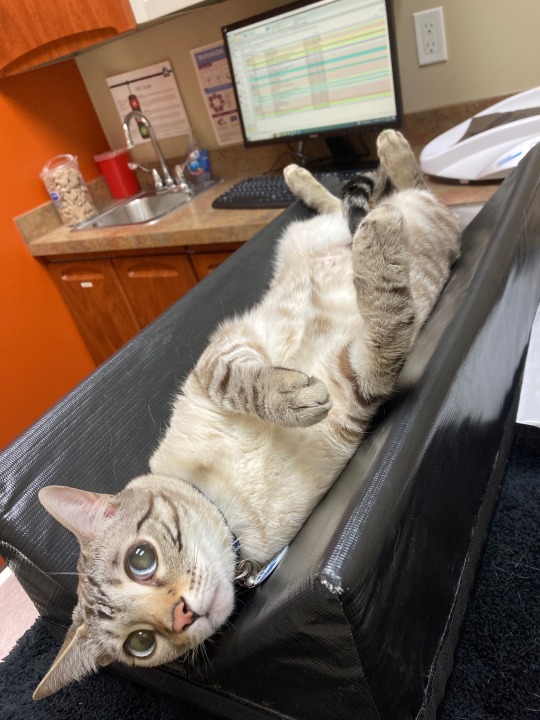
(A photo of Kepler at the fear free vet, allowing them to lay him on his back for an ultrasound and urine collection.)
Regarding ethics, the issue most look to is the Wild x Domestic cross of the asian leopard cat and domestic shorthair. In the United States and other countries with lax animal welfare laws, poaching and private ownership of servals to create the Savannah breed is an ongoing issue, so it makes sense to want to apply the same logic to bengals.
The reason the cross is not an issue to me personally is that the bengal is considered a "closed breed" under the TICA and CFA, meaning that breeders can no longer register and show <F4 bengals or create new bengal bloodlines by outcrossing to the asian leopard cat. As of this change reputable registered bengals are considered a fully domestic cat and not a wild cross.

(The CFA breed standard stating no bengal can be outcrossed to asian leopard cats.)
This means that so long as you source your pet from a registered and reputable breeder, you are not contributing to the poaching or the unethical breeding of wild mixes. It's a fantastic inclusion, as it also actively discourages people from poaching, owning and breeding wildlife. It also makes it clear to potential cat owners like myself which breeders to avoid (ie. those that don't register or show their "bengals").
As an Albertan Canadian I also have further peace of mind as it is illegal for people in this province to own or import wildlife or wild mixes F4 or below, so there is no chance of getting a poached cat (or its offspring) unless I went to the black market or a particularly shady breeder.
Are there people in the United States and other countries that still cross domestics with ALCs? Most definitely. But I personally don't think that owning a cat that is;
Purchased from a reputable breeder;
Barred by law to be a recent outcross; and
Registered under a cat fancy that discourages outcrossing
actively supports modern poaching or unethical wildlife ownership. Cat fancy has taken steps to minimize the harm of bengal breeding and ownership on wildlife while still preserving a bit of cat history. Those steps are sufficient enough for me to be comfortable with it, and I hope that breeds like the savannah cat follow in their footsteps with a closed breed standard.
That being said, if the history of the bengal upsets you or is something that rubs you the wrong way, I wouldn't fault you for it. Wildlife and animal welfare is a bit of a tricky business, and it's not always black and white. Just make sure to do your research and be open to multiple opinions. I appreciate you reaching out to me, and I hope my own thoughts have given you something to think about, even if you don't agree. Cheers!
#long post#like super long#im so sorry lmao#thanks for the ask!#cat breeds#bengals#i love bengals#i could go on forever about bengals#bengals are the light of my life#(and dave too i also love him)#apologies if that sounded at all condescending that wasn't my intention#i just get really into talking about cats
536 notes
·
View notes
Note
hello! I just wanted to know your thoughts on orcas living in accredited facilities. are they thriving, or are they too smart to be 'locked up' as ARAs say? I've been debating myself on this for a while, and I wanted to ask someone ^^^
Are captive killer whales doomed and depressed? Was it right to end the breeding program?
Hi there! Thank you for being curious and asking these questions!
I can tell you that current welfare data of killer whales in accredited facilities does suggest positive welfare eg. demonstrating optimistic welfare states and demonstrating healthy social and reconciliation behaviours in Loro Parque orcas. (source) (source)
Unfortunately we just don't have a whole lot of welfare data for killer whales the same way we do for bottlenose dolphins. But that's sort of a generalised answer.
I want to address your questions specifically though.
Are orcas "too smart" for being in human care?
I'd say that the intelligence or the supposed hyper intelligence of cetaceans has been overblown and has been the source of contention since John Lilley came on the scene in the 60's making wild claims about hyper intelligent dolphins that speak their own language that still persist to this day (never mind the guy killed dolphins in his experimental brain scans and gave them LSD... the 60's were wild).
The people claiming orcas are too intelligent are people like Dr. Lori Marino - a neuroscientist who makes unsubstantiated claims about cetacean intelligence and draws conclusions about intelligence and cognition from brain scans. Can brain structure give you some data to make educated guesses on intelligence? Sure. But you can't then draw conclusions about welfare about animals you've never examined or done a welfare assessment of.
None of the people making these claims have done objective welfare assessments with access to health and veterinary records.
Lori, as well as other lobbyists like Naomi Rose and Ingrid Visser, have been called out by the scientific community more than once on publishing papers that make unsubstantiated claims about welfare.
My colleagues published this paper refuted their claims that orcas were being "damaged" by captivity (using human comparisons of prisoner of war camps despite human and killer whale brains being separated by millions of years of evolution) . But the media had already picked up the catchy, shocking paper that got published by a journal with no cetacean experience ( the Journal of Veterinary Behavior who also refused to retract the paper despite letters from cetacean welfare scientists)
There is unfortunately a huge problem of lobbyists who are lobbying governments to change laws on cetacean welfare who are using science to skew data for their personal beliefs. And they are absolutely shameless and will block any other scientists that try to refute them.
If anything, intelligence creates adaptability. There's a reason we have bottlenose dolphins in human care around the world but not harbor porpoises. Bottlenose dolphins are socially intelligent and more easily adapt to new environments and bond with human care takers. Orcas are similar, though environmental change has been reported to upset them a lot more. They are very socially intelligent, which makes them very interested in learning and being curious and bonding with human caretakers.
If captive orcas were truly so utterly broken the way they're depicted by media and these "studies" they would not be able to learn new behaviours, they would not eat and play and socialise and they would not engage with the trainers and guests.
See a whole playlist of SeaWorld orcas in their free time - it really helps you look beyond those 10 second "sad SeaWorld orca" videos (it's usually just Keet resting because that's what he prefers to do in his spare time)
Are orcas in accredited facilities "depressed" or suffering in any way?
Now when it comes down to actual welfare of orcas in accredited facilities - based on anecdotal and scientific evidence, statements from trainers I've talked to who work with the animals every day (no they're not getting paid any more than minimum wage and speak freely), what I've witnessed through many hours of observation ect.
I can say with a fair amount of certainty that these orcas are not abused, depressed, doomed or going insane. They have a robust enrichment program, get the best vet care in the world (I'm sure @orcinus-veterinarius can attest to that), are engaged and motivated to learn regardless of satiety (though they'll have their off days of course) and they have good stable social structures that rarely see any hyper aggression (but aggression is normal in social groups too).
Could it be better?
Absolutely. If it were up to me, they would have the Blue World project done and built, bigger habitats, more novel enrichment ideas to encourage hunting behaviour that's not just Big Ball TM (they love it and it's easy but we can do better), more autonomy of habitat eg. being able to turn on water jets when they want to.
And waterwork would still be a thing trainers can do - not for shows but for the unmatched relationship building and desensitisation that it gave these animals. It actually made them safer to be in the water with (look at Kamagowa Sea World orca waterwork and how blaise they are with their whales - those whales will allow any sort of nonsense and someone falling in their pool wouldn't worry me at all)
What about the breeding ban:
I understand why they stopped breeding to appease the public but unfortunately it has introduced other welfare problems. Female orcas cannot be on Regumate - birth control - for longer than a year or it'll destroy her body very quickly. So separation of females and males occurs. And that can be really stressful - especially for matriarchs like Katina who had to be separated from Makaio.
Breeding bans are not done with the welfare in mind. They're done as a sanctimonious "save the babies" effort to "protect" them from no actual documented suffering. While denying animals the natural and very instinctive behaviours of reproduction.
It's amazing how much a calf can enrich a pod. Everyone pitches in to babysit and watch out for them, to teach them how to play and how to learn. It's really sad that the orcas of SeaWorld have been denied that now and it'll be very sad to see them die off one by one until there's only one very lonely whale left.
Anyway I hope that answers some questions. Happy to answer any more you might have.
103 notes
·
View notes
Text
My own personal Scooby-Doo re-imagining canon includes:
-out and proud lesbian Dominican/Puerto Rican Velma (yes I'm projecting, leave me alone)
-Velma has audhd
- velmaphne happens eventually
-sapphic/unlabeled daphne
-ace/homoromantic and autistic Fred Jones
-he's dating Shaggy who is a pan Trans man
- they are adhd/autism boyfriends
-fuck it, they're all autistic and you can fight me
-Velma and Fred have a shared special interest in machines and will talk about it with each other. They love to share what they know or what they learned and talk about improvements to designs and the like.
-daph and Fred grew up together. Daph's family works in politics and Fred's dad is running for governor or some other government role. Maybe daph's dad is a congressman.
-Daphne is very romantic and tried to liken their relationship to that of a fairytale with Fred being her prince charming but it didn't work out that way
-the two are fs soul mates just not the ones Daphne wanted originally
-she did play match maker to shaggy and Fred and it was a feat. Although, she couldn't clock velms would practically break her back bending over backwards for her.
- they meet in college where velms is majoring in forensic science , Daph is double majoring in business and hospitality (because of her parents) but she switches to journalism where she is much happier, Fred is in Mechanical engineering (idk it makes sense imo) and shaggy is majoring in veterinary science or culinary arts.
-they met in a creative writing class for their humanities credit where they find out they have a shared love of horror movies and mysteries. They did seriously debate on creating a Vincent Van Ghoul fanclub.
- they don't become an actual mystery solving group until they find out about a missing person's case for a student in their class and decided to take matters into their own hands
-found family™ they understand each other like no one else
-besties shaggy and daphne! Daph is a huge foodie and runs a vlogging channel with him! They love romantic comedies and this one novella in particular and will have frequent sleepovers where they do each other's nails and hair and gossip and fan tf out
- Fred joins in on occasion. He loves it even though he doesn't know what's going on. He does engage when he can though and somehow becomes very versed in the relationship dynamics of the show
-shaggy plays wingman for velms and daph and will listen to both of them pine over the other. He is tired.
-velma is fluent in 5 languages and uses them frequently, even to flirt.
-Daph can speak 3 but mostly just to talk business.
-daphne tries so fucking hard to live up to the expectations that her parents has for her and she does but they are never completely satisfied. Her whole arc is finding her own sense of self outside of her family.
-she's head of the cheer team, debate club, and the fashion column in the school's newspaper and graduated saludatorian at her high school
-Velms is also a journalist and she will try and work with daph when she can
-Supernatural occurances does happen. Eventually at least. In the beginning it's their regular whodunit shtick until they meet cosmic horrors that even Lovecraft couldn't imagine and cults (gasp)
-there will be stakes! It will be mature and dark but bc the plot calls for it
-daph was a part of the hex girls as she roadie and backup to Thorne, she did use this fact to flirt with velms.
-They are their brujas on speed dial.
-The gang doesn't know how Daph did it or for how long and they'll never get a straight answer. One day daph will say she found them practicing in an abandoned space and the next she might say they met at a commune. Her favorite thing to say is "oh. You know." as cryptically as she can and just stare off into the distance, just for kicks. Shaggy is convinced Thorne is Daphs twin sister or clone and they won't try and convince him otherwise.
-the hex girls are a polyam couple
-Scooby is young dog instead of having grown up with shaggy. Great Danes only have like an 8-10 year life span where 6 is average. Shaggy found him a injured and wandering on the edge of the woods that's next to the school.
I do plan on writing out this fic but idk if it has any merit. If I do write it would anyone be interested in reading?
204 notes
·
View notes
Text

cw pet death
so my little freak of nature and i said goodbye last night which, as per other post about this, was silly and perfect in so many ways. from the death of one roman to another, and so it goes.
but yeah i just want to reflect on how i'm feeling to have it down because i'm devastated, yes, but i couldn't have asked for a better last day with her.
when we went with the steroid injections on wednesday, the vet was like 'in 48 hours you'll essentially see her at as best as she's going to be so you'll be able to decide then' and honestly by yesterday morning, she was very much the same except for the increased thirst drive and the slight increased interest in food (she licked a piece of chicken uau), so at that point making her linger would just see her decline from there.
yesterday was the first sunny day we've had in a good while -- sparkling sun and a high of 14. i rang into work and asked if there was anything urgent that needed doing, because i'd like to spend a last beautiful day with my cat. they were so gracious and covered for me, batting away a load of clients who decided they needed artwork on a friday before a long weekend lmao ok bye. spent a little time doing a last clutch of artwork with her sleeping on my belly in the sun.

got her into her harness and it was so clear that this was the right thing - she loves going outside, but hates that thing being put on her. i've modded it so that it has a clasp at the neck, but still clipping the torso bit always gets a hiss or two, but she just let me at it. got everything prepared including lining her backpack with a bin liner, a absorbent puppy pad, and then loads of fleece blankets and a couple of those instant heat pads.
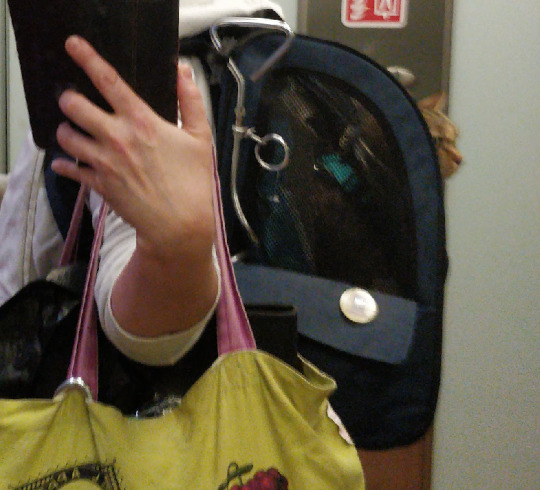
out into the sunshine and onto our usual walk - she came out on my shoulder to have a look at the world, but for the most part stayed curled up in the bottom watching everything while lying down.
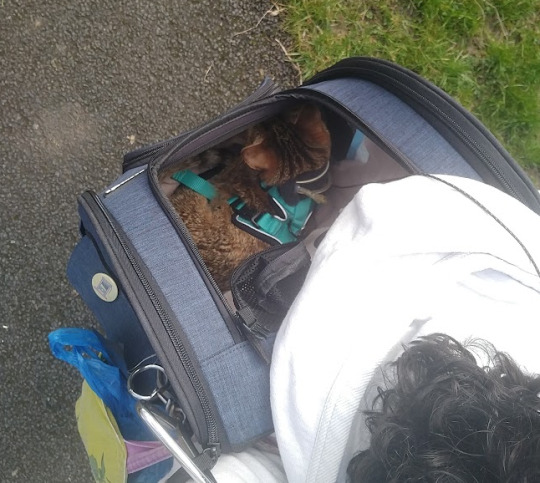
we got to the rag tree still cradling my gift pumpkins:
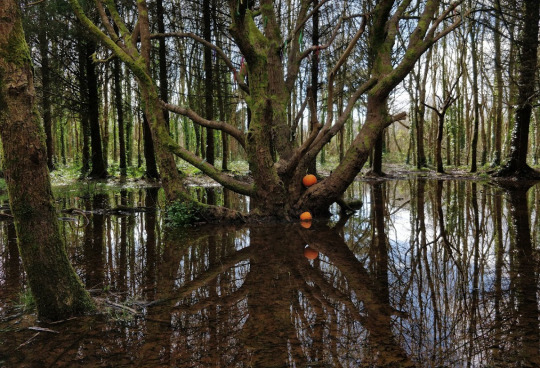
she got to walk on the branches:

the whole wooded area was prickling to life -- lots of leaf buds still tightly closed but getting ready, lots of tiny plant shoots making that first curve out of their seeds with their head still down in the shells
took the walk home through the park we always sit in behind the museum and watched the ducks on the shannon and listened to the river go by together
fed her for the last time on her window seat and then we cuddled some more while i rang my family so they could say goodbye to her on a video call
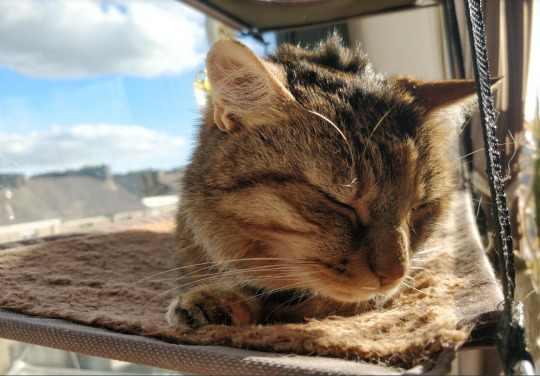
and then i experienced just pure love -- mo's been kind of a mascot for the branch - because of my apartment's location, i've been really lucky to serve as kind of a hub. i keep equipment and supplies for political stalls and protests, i host small meetings, etc. so her illness has been something the whole branch has known about and seen.
from the get-go i've had comrades offering help left and right, and during the last week, a few close comrades offered support in whatever way i needed it when her time came. i had to resist that depression tug to isolate, and just throughout the day as plans were taking shape, i kept in touch with them and i had a handful of my dearest come to the house before we made our way down to the vet. they left us have a few minutes alone in the house which... leaving that house with her for the last time was probably one of the hardest things. knowing she wouldn't be there when i got back. whew.
got to the office and got settled in and talked with the vet about postmortem plans. my first choice had always been to donate her body for study; i'd actually rang a few veterinary science schools, but i was told that their cadavers are procured through a closed system so that they can control for disease and whatnot for health and safety reasons. but the vet said that they'd would be honored to conduct a postmortem there and it would be really valuable for some newer vets in the practice, so that's what's going to happen. after, she'd still have been cremated, so i'm going to get her ashes in a scatter tube in a couple of weeks.
i had enough gabapentin to make sure mo was a bit stoned before going in, which was important for me because she usually has to be put into a feral cat crush cage to get any injections done because she's so fractious at the vets, but i was able to hold her while she got the primary sedative injection which meant so much.
she screamed like a hellcat and like....that's so her - herself to the very end! and i got the privilege of laughing about that with friends because they heard her from outside the door lol. they came in and gave her rubs and pets after she was sedated and i got to cuddle her loads after she got the cannula placed.
and my god that could have been so awful, but i had five dear friends who i love and who love me and who i fight and organize and struggle with who were there the whole time - they were out in reception chatting with each other and laughing and i could hear them in the room while i just held and and spoke to mo and stroked her fur, and that was so lovely instead of dead silence all alone.
vet came in and it was time; i held my baby as she pushed the euthanasia meds and felt her little breaths quicken and then slow before the vet checked her heartbeat. we laid her out on the table and i took pictures of all of her borlotti bean toes, we did pawprints, and i just got to pet her and stay with her for as long as i needed. she had a postmortem wee, and one of her wild postmortem reflexes was that her tail went full bottlebrush for about half a minute!
i took the blanket with me because it was hers, but wrapped her in a soft towel i had and just, yeah -- as the vet took her away she was talking to her just telling her that she did so well and she did. not just in that last moment, but just for 12 years she did so so well -- just the best old lady, my best friend in the whole world, the little beast that genuinely helped me survive lockdown, domestic upheaval, mental health struggles -- my walking buddy who's a minor local celebrity in her own right, and i was so so so lucky to have her.
and then we all went to our usual haunt which by perfect chance is right around the corner from the vet's office and toasted to her and just spent time together and just... if her last gift that she gave me was truly knowing that i have people who i can call on at any time, well then that's a hell of a gift.
going home was hard, but got to speak to my family and recount it all which helped and got so much love from them, too, and yeah look.
it was heartbreaking, but also heart mending.
truly the good death.
14 notes
·
View notes
Note
Hii, happy STS!! Because I didn't send an ask last week, this time you get two questions, hehe. You can do one or both!
1. What au for your story you think would be interesting to explore? Have you ever written a, hm, fanfiction? authorfiction? about it?
2. What major would your ocs pick in collage? It can be an irl major or related to your universe! (eg. elvish literature)
Happy STS! Thank you so much for the ask! I'll keep it to my Dimension Jumpers story for this ask.
1.) So I am obsessed with AUs, and I have a TON I think about regularly ngl. I explore alternate timelines and stuff in the series itself but I have been known to write self-indulgent crossovers from time to time. I dont typically do much with actual AUs except brainrot over them for a week or so and do a bullet point summary of what it would probably be like, but there's a couple ive considered writing stuff for before (Hellraiser AU my beloved).
2.) Pickle and Carter will never in any universe go to college fjdkfkgk. Carter would go to a technical school for mechanic work but Pickle is just grateful he graduated high school. Emily would KILL to major in interdimensional veterinary science, and Kira would probably be very interested in interdimensional conservation science or wildlife biology. In canon, Kira gets a degree in wildlife biology and management and Emily goes to nursing school.
#answered#flock-from-the-void#sorry for the late response my life is a nightmare right now lol#in a good way but my god have i been busy#i will at some point in the future send you asks back i promise#my brain is a sieve though so its likely i will forget multiple times#and for that i apologize gjdkgkg
2 notes
·
View notes
Note
I just wanted to say that after spending the entire day consuming everything but of wonderful content you’ve created there was one I was dodging, because I hadn’t watched Howl’s Moving Castle (I’ve been procrastinating it since the start of time) and I’ve been dodging spoilers left and right pretty successfully for a good chunk of my life but after finishing everything you’ve written (your narratives and plot and characterization and lovable reader personalities are so good 😭😭😭) I gave in and read the Vil Howls Moving Castle and essentially spoiled myself.
TOTALLY WORTH IT !! IT WAS SO GOOD IT TOUVHED MY HEART I LOVED THE WAY YOU WROTE HIM AND EVEN THOUGH I HAVE NO CONTEXT AT ALL- the way you worked it all together and how you described Vil’s predicament relevant to his actual character was so well done 💞💞💞💞💞
Thank you for existing, I love what you do!!
(I also want to pursue animal relevant medical activities in the future so it’s so cool to see another who is also!)
Howl's Moving Castle is a treasure, and I hope you have a chance to watch it!! The Vil story was a bit of spoiler, but mostly just for one character! And there were quite a few liberties taken throughout and lots of making things up to suit my own purposes. Howl and Sophie's story should still have plenty of satisfying surprises ;)
I'm glad you liked it all!! 💚
(And ahh! Yes! It's always a bit of a surprise stumbling upon other people interested in veterinary leaning sciences -- small profession, it seems. It's like running into your teacher in the grocery store, but a lot less awkward and with way more fingers guns lol)
27 notes
·
View notes
Note
hello there! curious autistic little shit whose special interest is zoology (entomology, specifically) here, so sorry to bother.
i would sell my soul to get a chance to actually study zoology, but the thing is, i have no idea what they do. after they graduate, i mean. do you have to become an academician at a university, or do you get to do something else too? if so, what? who hires zoologists?
i couldn't find any decent information on the web, so i thought it'd be best to ask somebody who's actually studying that at the moment. (if you aren't and i misunderstood you completely, well. it'd be very awkward.)
thank you and have a very good day!
No you absolutely guessed right, I'm also an autistic little shit with a special interest in zoology!!
It is true that a lot of folks who study zoology end up in academia/research. I think its helpful to remember that that doesn't necessarily mean working at or with a University lab! Generally speaking, museums, zoos, arboretums, and any other place with some sort of academic collection have positions. This is especially true for Entomology, in my experience. Entomologists seem to love keeping specimen collections, which creates a lot of positions for collecting/sorting/maintaining/archiving specimens. This route seems to appeal the most to people who just want to gather as much info about certain animal groups as possible.
Another major branch I usually see is wildlife/conservation/husbandry work. This one is more favorable if you're into animal handling and care (though its pretty dominated by charismatic animals like mammals and birds in case that's not your thing). Sometimes this is adjacent to academia, sometimes its more of a public service management thing like maintaining protected areas, and sometimes its more veterinary. Wildlife centers and national parks are famously understaffed, and zoos/aquariums are always looking for people qualified for specialized animal care (this would probably extend into entomology a bit more).
Then, of course, there's veterinary school. There's your veterinarians for companion animals, obviously, but also people trained in specialized/exotic animals (avian vets come to mind). There are also many veterinarians that go into agriculture, or caring for farm animals. (If you're really into domesticated animals, I recommend looking into animal science programs specifically rather than zoology as a whole). This branch requires a lot of work, and is very much the Zoologist equivalent of going off to med school, but tend to have the most stable and well paying job market from what I've seen. As previously mentioned, there are also positions for vets in specialized animal husbandry and care in zoos and aquariums, as well as in wildlife rescue centers.
Overall, most zoology positions are fairly specialized and require at minimum a 4 year undergrad degree, which is pretty frustrating. Most of the people I've interacted with in this field also plan to attend, are attending, or have graduated from some kind of postsecondary school, like grad or vet school. Its also kinda obvious that this isn't a field you get into for money or prestige. Most of these jobs are very much passion projects for anyone I've met who have them. Still, from one autist to another, passion's probably not something we have to worry about lol.
Anyway I tried to cover all the bases I knew about, but I'm just one guy and also like, obviously still a student so this definitely isn't comprehensive! Hope this helps though!!
5 notes
·
View notes
Text
tumblr book report time
okay, I finished Last Chance to See by Douglas Adams earlier today! I did say in the post a few hours ago I only had about 40 pages left. I also reread about another 80 or so pages that I read last year just to refresh my memory. So, I'm now going to do the (potentially) depressing task of listing out the endangered species features in this book, and seeing if any are still alive. I don't know yet how depressing or exciting this post might be.

Madagascar
This part of the book is from a trip in 1985, where they went to try and find the aye-aye lemur. I am pleased to report that the aye-aye is still alive, although still endangered. Woo-hoo! The aye-aye is the world's largest nocturnal primate, and is so unique it has no taxomic family (no related species.) They are considered evil, or harbingers of death, in folk belief, so they face danger from being hunted and killed.
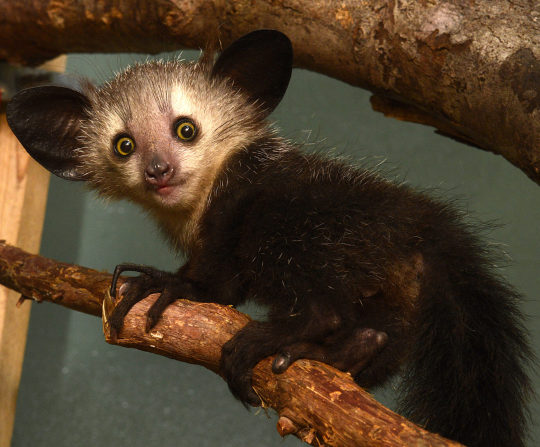
Indonesia
In this chapter, they travel to the island of Komodo to look at the Komodo dragons. Komodo dragons, thankfully, are still alive, but still endangered due to the fragility of their habitat. They're at risk of volcanoes, earthquakes, habitat loss, fire, tourism, loss of prey from poaching, and illegal poachnig in general. Climate chane and sea level rise also threaten their habitat. There are 1,380 mature individuals left in the wild and 3,400 total.
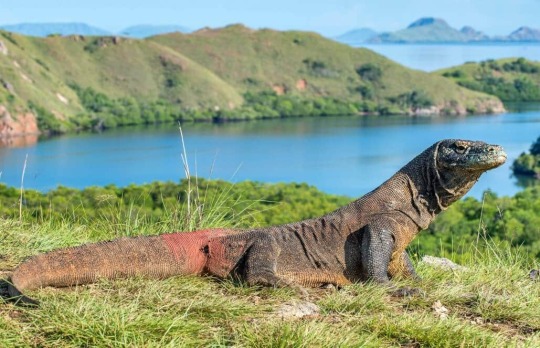
Democratic Republic of Congo (Zaïre at the time of the book's publishing)
In this chapter, they end up seeing two animals. They traveled to the country to see the northern white rhinocerous, but also ended up seeing mountain gorillas too because, as Adams says, "It is very hard to go all the way to Zaïre and not see them." Mountain gorillas, although listed as endangered, are still around. The World Wildlife Fund lists their population as just over 1,000 individuals. The specific area that Adams and Carwardine visit in the book, Virunga National Park, has seen an increase in population. When they visited in the late 80s, there was a population of 320, but as of 2010 there were 480.
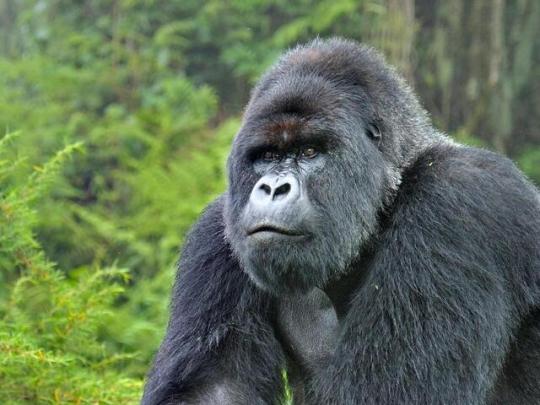
Here's where my post actually gets sad. The animal that Adams and Carwardine actually planned to visit in the DRC was the northern white rhinocerous. In 1988 at the time of the trip (or perhaps 1990 at the publishing of the book), there were 22 individuals left in the wild, all in Garamba National Park. Twenty two. Douglas Adams writes about the sad state of their population, and compares it to the success of the subspecies the southern white rhino. He ends that section of the book with the sentence: "The point is, we are not too late to save the northern white rhinocerous from exctinction."
Feeling very energized after reading this, I had set down my book and pulled out my smartphone to google the northern white rhinocerous. The bad news is, the northern white rhino is functionally extinct in 2023. There are only two left in the entire world, and both are female, mother and daughter. Garamba National Park has suffered years of turmoil from politcal unrest, wars, insurgents, and poachers. In 2008, there were no northern white rhinos left in the wild and only 8 left in captivity.

There's some tentatively good news. Before the last male died in 2018, his sperm was collected. The remaining two living females cannot carry babies anymore, but the daughter's eggs were gathered. There's a team of scientists trying IVF, and since 2019 they've managed to get 24 embryos from one female and two males. They're planning on using another southern white rhino as a surrogate. Will this save the species? Who knows. Any babies that result will have to be inbred--either siblings or half-siblings. No genetic diversity remains in the subspecies. But it is interesting to me since this sort of thing used to not be possible at all for endangered species.
New Zealand
The first birds mentioned in this chapter is the Kea, which is also endangered, but this chapter isn't really about them. It's about the Kakapo. The Kakapo are probably my favorite animal described in this book, because they seem so silly. It's a wonder they never managed to go extinct at any point in history. I love them. Fortunately, there's good news for Kakapo: they're doing better!
Actually, I saw a tweet about them literally earlier today:
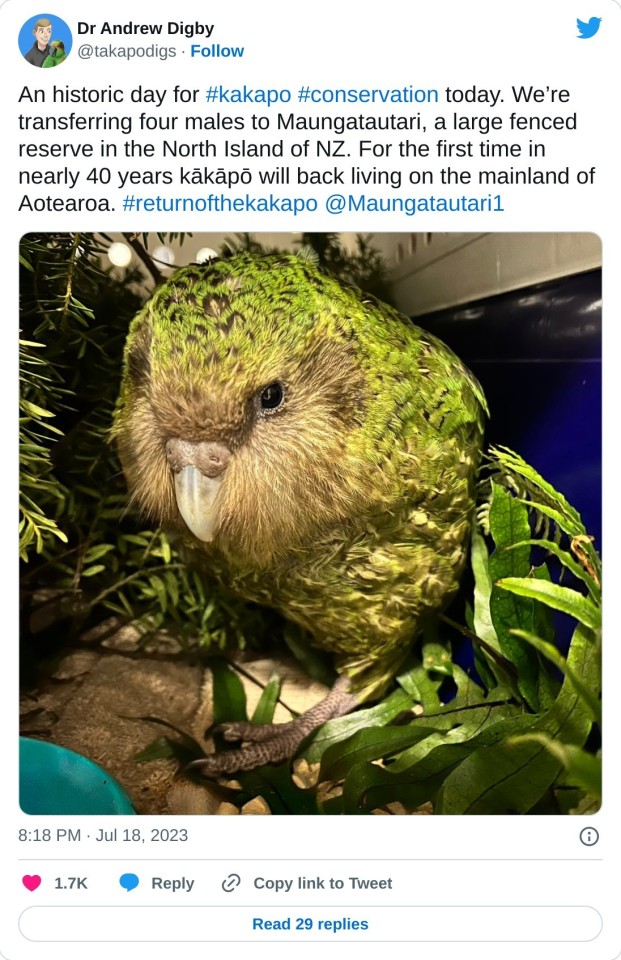
They're still considered critically endangered, but this is good news. As of 2023 there are 248, which is a significant increase in the ~70 that existed when the book was written. Yay, kākāpō! They're very cute.
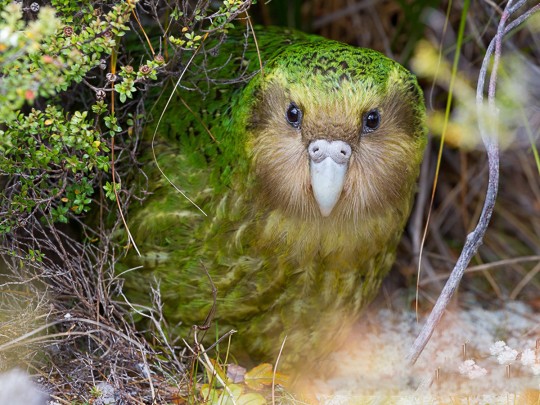
China
Here is where the post gets sad again. In this chapter, Adams and Carwardine visit the Yangtze in search of the baiji river dolphin. It has been 21 years since the last confirmed sighting of the baiji, and 17 years since they were considered extinct after no trace of them could be found. I find this particularly sad, because part of the chapter in this book has Adams and Carwardine visiting with the Tongling Baiji Conservation Committee, and their construction of a nature reserve on the river. The end of the chapter seems hopeful based on this hard work, so I also feel quite sad for all these people in 1989 who cared so much and were still unable to save these animals :(

Mauritius
This is the final chapter of the book, and covers quite a few animals. The original intention was for them to be looking for the Rodrigues fruit bat. These bats are endangered, but with increasing population. By the time of the book's publishing in 1990, the population had just passed the 1,000 mark. The Philadelphia Zoo website says with breeding programs, there are now 20,000 left in the wild.

Another species mentioned is the Mauritius Kestrel. In 1974, there were only 4 individuals left. Now, thanks to breeding programs, there are about 400 left in the wild as of 10 years ago. That's amazing, but it is a bit worrying still--in 2005, there were 800 in the wild. So there was a wildly successful reintroduction and now the population is dipping again. But if they survived it once, I think we can help them survive it again.
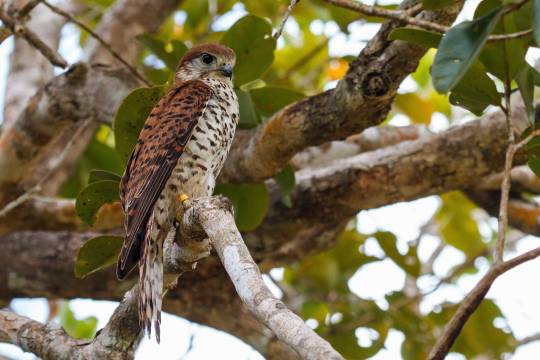
Another bird mentioned is the pink pigeon. As of the publishing of the book in 1990, there were less than 10 in the wild. Now, thanks to conservation efforts, there are approximately 480. They've suffered some loss of genetic diversity, though.
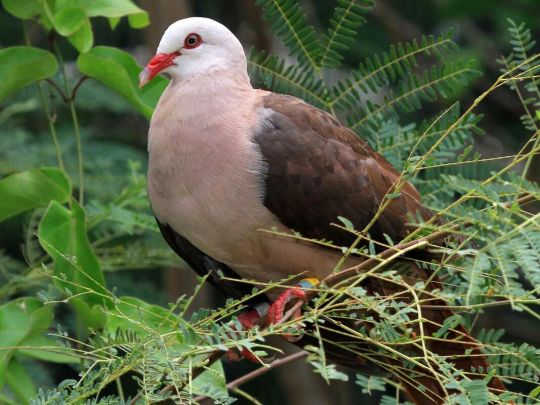
Finally, the echo parakeet is mentioned. As of the time of the book's publishing, there were less than 15 remaining in the wild. I am happy to say that as of 2020 there are more than 800 birds left in the wild, and their status has been moved from endangered to just vulnerable--a step up!

That brings me to the end of my tumblr book report. I was actually mildly surprised and happy to see that only two of the species mentioned in the book are extinct/functionally extinct, and that the others were saved from the brink. I seriously thought while googling some of the birds at the end that they would be gone, but fortunately they're still around.
Goodnight! I spent way too long writing this!
#i'm becoming a book blog now#long post#quara talks books#maybe talking about what i read will like. make me read more#i'm off to a good start this year but overall the amount of books i have Actually read recently is still depressingly low#im gonna change that though i promise
14 notes
·
View notes
Text
Ratch has studied and focused primarily on Applied science, which includes more than this list because there are advanced alien categories not describable by Earth words and also him reading about it occasionally doesn’t make him an expert on that topic, so, THESE ARE THINGS HE KNOWS A SUBSTANCIAL AMOUNT ABOUT not things he might know a little a bit (... even if ‘a little’ could be a lot by our standards hgksjdhf).
List of Applied Sciences that he either officially studied as a medic, or he knows enough about at this point that he’s trusted on the topic regardless. Several of these overlap but I wanted to mention specific ones sometimes rather than just a broad category:
Aerospace engineering - partially due to the fact that some tfs are capable of space travel without a ship (such as those that can turn into satellites) or they ARE a ship (such as those that can turn into shuttles), partially out of his own intrigue with transportation and spacebridging technology, which later leads to his ability to create the groundbridge variation even with Earth’s limitations.
Anatomy
Applied mathematics
Applied physics
Biomedical engineering - yes he knows how most of the equipment he uses works and he can build it which is how they have any of it on Earth.
Chemical engineering
Computational geometry
Computer engineering
Computer science
Dentistry - this is not something he intended to focus on, but there wasn’t anyone else to take care of it as medical professionals dropped during war. so. he does. and he stops once there are others who can take care of that again post-reconstruction of their planet. because honestly he doesn’t want his hands in others’ mouths.
Electrical engineering - especially electromagnetism due to the field produced by sparks.
Electronic engineering
Marine engineering - related to tfs capable of turning into marine vessels.
Mechanical engineering
Microtechnology
Nutritional science - nutrition but for vehicles, such a fuel combinations healthiest for specific builds, minerals, etc for needs ranging from paint nanites to lubricant for internal workings (eventually studies human nutrition on Earth).
Optometry - this is actually one of the most aesthetically fascinating to him of their biological variations, because you’ve got dilating optics you’ve got solid optics you’ve got multicolored optics there are SO MANY OPTICAL FORMS (plus types of vision) and they are amazing.
Physical therapy - strong evidence of this during bulkhead’s physical recovery after getting wrecked by hardshell, because Ratch has him doing exercises but also stops him from Overdoing it too.
Physiology
Software engineering
Veterinary science - because of tfs with animalistic alt modes, but also out of his own interest and the sense of peace he finds in the wilderness (on earth or cybertron), he Will help an injured creature if he finds it or is presented with it.
Natural Sciences aka overlapping or exceptions due to familiarity or casual interest, but he has not intentionally studied everything that falls under these massive categories:
Biology - I think this is self explanatory, but beyond robotic, he has studied organic forms more extensively in recent ages due to space travels after the exodus from their homeworld and due to living on Earth. Includes his casual botany, neuroscience, and zoology interests.
Chemistry - although he can use his knowledge for analysis and creation/counteracting a problem when necessary, he cares about metallurgy and mineralogy more than most matters in this category. Also includes his knowledge of nanotechnology.
Physics - again, he can use knowledge for analysis and problem-solving, but he cares more about thermodynamics (which is part of chemical engineering mentioned above), mechanics, and psychophysics than most matters in this category.
TF Specific honorable mentions because I’m sure it qualifies as its own category:
Blacksmithing - perhaps one day I will be able to come up with a more technical term for assistance in developing well-born newforges, but for now, it is a term known by many due to idw so I use it.
Carrying and Pediatrics - again, I haven’t come up with robotic technical terms for their methods of budding or kindling to create sparklings (and their care/development afterward) because none of it is the same as humans (and I don’t share a lot of fanon concepts either hfsjkdhf), but I still use these terms so you know loosely what I’m referring to.
#i will add a link to this to my profile page bc if I'm going to spend this much time on research I want it easily accessible HFKSJDHF#do nt re bl og pl s#[CANON|HC NOTES] heart full of broken dreams#[BLUE SPEAKS] ooc#long post
15 notes
·
View notes
Note
Went through doves and the plants and you’re genuinely so interesting…. What fun do you get from that it seems to work you up moreso than it does bring joy?
Regardless you seem to have a pretty firm opinion all vegans have never worked with an animal once in their life, I have an animal welfare degree, and had a vegan lecturer and 3 vegan coursemates then, and I’m now studying a veterinary degree and have 6 vegan coursemates. Plus have 3 years of animal husbandry work under my belt, and doing agri (dairy and pork ‘high welfare’ farms) was what turned me vegan due to how I couldn’t condemn any of it as a result of what I’d learn in animal behaviour and welfare. We aren’t all the city dwelling strawmen you make up, sometimes experienced/educated folk can have opinions that disagree with yours 🤠
I'm very happy for you, because you are happy and comfortable with your vegan lifestyle, and you have friends who also share the same lifestyle with you. You are a very accomplished person, as studying the veterinary sciences is no easy feat. Really well done! But we should also keep in mind that some others may not have the same experience and knowledge in the field as you do, so we should also recognize that it's a bit easy to mix up veterinary sciences and animal husbandry, though both are quite similar in nature.
To answer your question, I keep everything vegan and animal welfare and whatnot related in that tag so that the three people following me can blacklist it so they won't hear about it, 😅. I know some are quite uncomfortable with being close to discourse, so I try to keep my page well-tagged, for me as well, so I can quickly look for a post. For your question, however..I'm not exactly sure if it gives me fun, but it does concern me a little because veganism is a very varied topic, and it brings up a large requirement of discussion and debate, and I try to contribute in places where I think I may be able to provide my own perspective, so that the audience reading would be able to pick a side, whichever they might want to pick.
Three years of animal husbandry work is big achievement, but I will add that, though it is a wondrous feat, in my point of view, it's not exactly enough years to truly learn and fully immersed in the work. Though, I cannot say this with certainty because with what information you provide to me, I don't know where you worked, what farm was it, was it a reputable one, what school did you go to, what sort of persons did you meet and what environment you were in, the climate, what you did on a daily basis, (and even if this was a paid internship or a vacation to the countryside with relatives) and all of those other things, I don't know. I think that three years would be good enough to say you do have first-hand experience in regular matters, but maybe with a bit more experience and some regular research and training, dipping a good portion of your toes into the broad waters of the animal industry, I think you would learn a lot more things, and be able to see things in a lot of other perspectives, and meet folk who have been doing it for quite a while. I think this is most important, because you can meet them and ask why they stayed; and why they do what they do. I haven't met a single farmer that do what they do and hate animals. I think that, they love and respect their animals, and farmers want their lives to be as comfortable and happy as humanely possible.
I know farmers who have been doing what they do for over three decades, and they claim they are still learning, like I am as well. I'm not exactly sure where the strawmen came up though, and in this context, it's rather difficult to determine what the remark means. However, I'm sorry to say you're wrong on the last part. I do not think every vegan is 'city-dwelling' and inexperienced. I do agree that experienced and educated persons may disagree with me, and I actually encourage such, if they can explain why so, and with their own experience, instead of relying on twenty seven different articles found online. My professors always said that a book, or a reference on paper, cannot replicate the actual experience, which is why medical students are not only quizzed on their textbook knowledge, but are also provided the opportunity to learn in the environment they will work in, and adapt as required, and experience.
Thank you for taking the time to reach out to me in my inbox. I hope you have a wonderful day or evening, anon. ^^
4 notes
·
View notes
Text
2017, the Year I Nearly Gave Up but Didn’t
I have always wanted to start a blog about my life, but never really got round into doing it. I blame my “all-or-nothing” attitude. No doubt, this mindset has gotten me places in life, but at other times I find myself fighting an internal battle with my own thoughts. So, here I am, a newly graduated veterinarian, at the age of 25, using Tumblr for the very first time. Obviously, life as a vet student got too busy for me to even process my own thoughts and feelings, let alone starting a blog. Although, perhaps I was “semi-avoiding” those thoughts, as I know, for a fact, that if I do indeed allow myself to dwel into the unknown, I might deterioriate. Besides the overwhelming amount of content that gets taught to us every single day, there was also a seemingly continuous pilling of random assignments, mini exams throughout the semester, dealing with friendships, minimal sleep, etc, and not to mention the pressure to actually perform well. I, unfortunately, gathered the habit of setting unrealistic expectations on myself. Obviously, my mental health was sacrificed, ignored even, that, unfortunately, affected my performace, relationships between family and peers, and also my own self-confidence. Don’t get me wrong, though; vet school is an extremely rewarding degree. On the good days, you get to see the smile on your clients’ faces, the wag of a puppy’s tail with paws too big for their size, purring kitties, the re-visiting old cat with hyperthyroidism that has been improving and still as sweet as ever, and not to mention the lovely teaching staff members and life-long friends that you make along the way.
Thought I’d share my journey on how I got accepted into the degree; because veterinary science is something many would love to do, but, if you were anything like me, had this belief that this dream of mine was close to impossible.....since I was never naturally smart, and was FAR from being an A+ student. But I am here to tell you today that any dream is possible, you just need to be willing to put in the hard work and grind.
I completed high school in Christchurch, New Zealand in the year of 2015. As a student, I always had an interest in science and animals; and so veterinary science had always been at the back of my mind ever since. The only problem was, that I never believed in myself. Regardless, I applied for the pre-veterinary programme at Massey University New Zealand, and basically “half-arsed” my way through the first semester. To no surprise, I was not accepted into the degree. I remember contacting the undergraduate staff to seek advice for re-application; and was told, that I was required to get at least ALL A’s for ALL papers for 4 more semesters. That was my wake-up call; that there was really nothing else I’d rather do with my life, so if I really wanted this, I had to put in the work. I remember my father sitting out by the deck at my old house in Christchurch, and me opening the window from my room, saying...
“Hey dad, um, just so you know, there is a very likely chance that you will not see me for the next 2 whole years, as I will be too busy burying my face in books.”
That was when the grind started; I enrolled myself in other science-related papers such as Biochemistry, Genetics and Conservation. I was studying non-stop, round-the-clock; only making an appearance at meal times. Exam periods were extremely stressful; there was a time when I only had a day to revise a semester’s worth of a Genetics paper...and I was sitting on the floor of the dining room at 2am, bawling and feeling absolutely hopeless (embarrassing, I know, but to my surprise I did well for that paper, lol). I remember setting up unrealistic rules for myself, and my typical day went like this:
4:00 am : Wake up
4:30 am: Begin study
and pretty much having my head in my books all the way until 10pm.
Little things would trigger me; such as when I went 2 minutes overtime on a topic, or if my lunch order was late since I had to rush back to study. Not fun.
2017; the year I finally got my grades up with a GPA competitive enough for vet school. I re-applied for vet in 2017 with a GPA of 8 out of a 9 point scale, with my latest semester grades of straight 4 A+’s. I remember the day that they released the selection outcomes; and the agonising wait that came with it. I was playing a movie on my laptop while spamming the “re-fresh” button on Yahoo! Mail. Results came 2 hours later than the expected time; and without opening the email, I peeked at the first sentence that popped up in the preview;
“Kia ora Weiyin,”
What? Why didn’t it start with a “Congratulations!”?
I clicked open the email and to my utmost dissapointment, I was rejected. The heartache and dismay that came after was nothing like I’ve ever experienced. I gave absolutely everything, continously for 2 whole years, and was still rejected. I cried my heart out.
As I am writing this, I just asked my beloved grandmother how many tears I cried when I got rejected, and she just answered me with “enough to make my heart break.”
Why was I rejected? Because the school had implemented a new selection system; instead of the GPA comprising 80% of the overall ranking, it was lowered to just 50%, and the other 50% comprised of non-academic skills i.e. multiple-mini interviews (MMIs), situational judgement tests (SJTs), etc. This implied that not only I had to continue keeping my GPA up, but also to ace the non-academic part of the selection process.
I felt hopeless at the time, and thought that, maybe, it was just not meant to be.
Or maybe, just maybe, if I just gave one last try.
And so I enrolled myself into “Toastmasters”, a public speaking club. There I learned to be comfortable speaking in front of an audience, practice active listening, and form creative ways to craft out a speech. It was such an experience, and it was amazing how easily you can turn nervousness into excitement when giving a speech. Every day, I would practice all kinds of scenarios that were likely to be tested in the MMI. I continued to do these until impromptu speeches felt almost natural to me.
Year 2018 finally came. I remember it being about 4:00 am in the morning, on the 7th of July 2018, when I checked my email. That was the moment I received my acceptance letter. Of course, my family were all waiting anxiously for my results...
“Hey ma, pa, looks like I’ll be graduating soon...” At the time, I was almost done with completing my Biochemistry degree. They responded with a very saddened “Ohh...”.
Then I continued, “in 5 years time” ;)

2 notes
·
View notes
Text
Most science journals themselves do not post corrections of studies even when the author of research of a study themselves comes forward after finding a mistake or admitting fraud. They probably would arrest if it were a woman mind you, let's be honest. But still, it is worth looking into research integrity and research integrity officers.
https://www.statnews.com/2023/01/10/corrections-retractions-journals/
Honestly a lot of this could be avoided by publishing research that doesn't go their way, it would also avoid others endlessly pouring money into the same study for centuries on end. Despite the fact people say it is harder to study the social sciences, natural sciences and hard sciences genuinely have more errors in their studies that get looked over. This isn't to say it isn't more of a problem in social sciences when the results dictate how people see society and which direction it should go or use a current state as "natural proof" to do nothing to change for the better, however researchers or specifically journals are given far too much credit. There is more of an incentive to keep the status quo and be hush hush, not to mention money entering the equation and social acceptance, than to really do science. Pretending to study for progress can allow one to remain exactly where he wants society to be while the people believe the myths they were taught are truths after all. Ironically though , I suppose the justification is that in a way works in everyone's favour because if everyone knew how everything actually works, a lot more bad would be done against women using said information. The truth is it doesn't of course, but anyone covering up their tracks and that of their fellows will use any excuse they make up on the spot to detract from the fact they're awfully incompetent and dangerous. Even those who are competent do not get their voice heard to retract or correct studies.
At least, I personally haven't come across a man who hasn't given up on correcting his own studies (and has the corrected version be more popular, I should really emphasise as that is what is really rare). Dr Robert Greene who put forth the alpha male theory debunked it 3 years later but journals and journalists weren't having any of it, even veterinary schools continue teaching that nonsense to this day so it is no wonder when you watch animal documentaries, go to the zoo or work in an animal shelter that you hear professionals of all people spouting such lies. Bearing in mind he debunked in the early 1970s!!! Worse, it is applied to animals other than wolves when that was never its intent , because research as it turns out, are not very good at doing their own research. What they are good at is falling for logical fallacies and transferring onto other topics things that aren't reasonable to apply them to. Like how people speak of pheromones when they do not exist in humans or in scientific parlance, have never been proven to exist in animal species other than insects. Other species such as some plants, ciliates, basic unicellular prokaryotes have been studied but they are neither animals nor mammals so claiming humans have pheromones is unscientific nonsense. I mean some multicellular eukaryotes have been studied but there isn't any proof humans have pheromones. Pseudoscience at best. Or how the myth that the clitoris has a thousand nerve endings in humans when they study comes from cows. Genuinely nobody should blindly follow science. You may not intend to become a scientist but for your sake, and that of anyone who you share information with, you *must* become scientifically literate. Otherwise you are just following another religion. More often than not, science is used in the interest of misogyny and Patriarchy because it is not done scientifically. Says all you need to know about who actually does science better.
remember that study that came out a few years back that claimed that countries with MORE gender equality have LESS women pursuing STEM careers? and a ton of people were pointing to it as 'innate sex differences', and we ourselves were trying to theorise why this could possibly be?
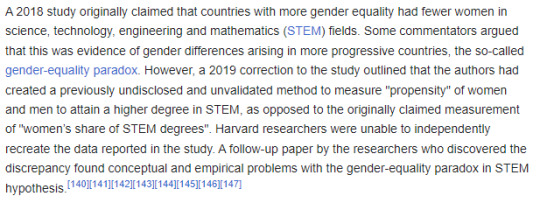
it was a bunk, unrepeatable piece of shit. also, the two MEN who published it have been claiming that women are biologically less geared for science than men for decades, so complete bias. they have their belief and work backwards to try and 'prove' it, the complete opposite of what actual scientists are supposed to do.
funny how the media and people who pushed this online never posted corrections.
1K notes
·
View notes
Text
My Love Mix-Up! ep 10
I still enjoy this series but it could easily has 10 ep and everybody will be happy, they are dragging it soo much, but at the same time I have seen worst
They have a horse to just show students in veterinary faculty in Bangkok
(I did a bit of research and it looks like veterinary studies are structured very differently in Poland and Thailand. in PL there are only 7 places - all public univerisites - where you can study and it's quite strickly regulated. but maybe Warsaw University of Life Sciences do have some horses to show off on open days)
this Dad is really scary like really
wow that's interesting family
Half was always funny but the is making me cry from laughter this ep
this is so absurd and camp I love it
uwu
they are actually kinda suprising at times
1 note
·
View note
Text

Lonely tree on a hill made of crystals of the conditionally essential amino acid cysteine under polarized light microscopy. Cysteine has been shown in studies to play various important roles in the body, making an important antioxidant glutathione, is given to treat Tylenol overdoses, and regulates the neurotransmitter glutamate.
Studies have shown potential for treatment of respiratory, brain and kidney disorders as well.
I've often browsed through tumblr in the past but thought I'd try actually using it at the recommendation of my son, and for reasons. I'm not the most insightful person in the world but I love science and art. I hope anyone that comes across this enjoys seeing some little micro artworks of thin crystal films under my polarized light microscope and the occasional interesting image from my day job in a veterinary pathology lab.
Cheers!
1 note
·
View note
Text
Kay Jamison:
"Both my mother and father strongly encouraged my interests in writing poetry and school plays, as well as in science and medicine. Neither of them tried to limit my dreams, and they had the sense and sensitivity to tell the difference between a phase I was going through and more serious commitments. Even my phases, however, were for the most part tolerated with kindness and imagination. Being particularly given to strong and absolute passions, I was at one point desperately convinced that we had to have a sloth as a pet.
My mother, who had been pushed about as far as possible by allowing me to keep dogs, cats, birds, fish, turtles, lizards, frogs, and mice, was less than wildly enthusiastic. My father convinced me to put together a detailed scientific and literary notebook about sloths. He suggested that, in addition to providing practical information about their dietary needs, living space, and veterinary requirements, I also write a series of poems about sloths and essays about what they meant to me, design a habitat for them that would work within our current house, and make detailed observations of their behavior at the zoo; if I did all this, he said, my parents would then consider finding a sloth for me.
What they both knew, I am sure, was that I was simply in love with the idea of a strange idea, and that given some other way of expressing my enthusiasms, I would be quite content. They were right, of course, and this was only further driven home by actually watching the sloths at the National Zoo. If there is anything more boring than watching a sloth — other than watching cricket, perhaps, or the House Appropriations Committee meetings on C-SPAN — I have yet to come across it. I had never been so grateful to return to the prosaic world of my dog, who, by comparison, seemed Newtonian in her complexity.
My interest in medicine, however, was lasting, and my parents fully encouraged it. When I was about twelve years old, they bought me dissecting tools, a microscope, and a copy of Gray’s Anatomy; the latter turned out to be inordinately complicated, but its presence gave me a sense of what I imagined real Medicine to be.
The Ping- Pong table in our basement was my laboratory, and I spent endless late afternoons dissecting frogs, fish, worms, and turtles; only when I moved up the evolutionary ladder in my choice of subjects and was given a fetal pig — whose tiny snout and perfect little whiskers finally did me in — was I repelled from the world of dissection.
Doctors at the hospital at Andrews Air Force Base, where I volunteered as a candy striper, or nurse’s aide, on weekends, gave me scalpels, hemostats, and, among other things, bottles of blood for one of my many homemade experiments. Far more important, they took me and my interests very seriously. They never tried to discourage me from becoming a doctor, even though it was an era that breathed, If woman, be a nurse. They took me on rounds with them and let me observe and even assist at minor surgical procedures. I carefully watched them take out sutures, change dressings, and do lumbar punctures. I held instruments, peered into wounds, and, on one occasion, actually removed stitches from a patient’s abdominal incision.
I would arrive at the hospital early, leave late, and bring books and questions with me: What was it like to be a medical student? To deliver babies? To be around death?
I must have been particularly convincing about my interest on the latter point because one of the doctors allowed me to attend part of an autopsy, which was extraordinary and horrifying. I stood at the side of the steel autopsy table, trying hard not to look at the dead child’s small, naked body, but being incapable of not doing so. The smell in the room was vile and saturating, and for a long while only the sloshing of water and the quickness of the pathologist's hands were saving distractions. Eventually, in order to keep from seeing what I was seeing, I reverted back to a more cerebral, curious self, asking question after question, following each answer with yet another question. Why did the pathologist make the cuts he did? Why did he wear gloves? Where did all the body parts go? Why were some parts weighed and others not?
Initially it was a way of avoiding the awfulness of what was going on in front of me; after a while, however, curiosity became a compelling force in its own right. I focused on the questions and stopped seeing the body. As has been true a thousand times since, my curiosity and temperament had taken me to places I was not really able to handle emotionally, but the same curiosity, and the scientific side of my mind, generated enough distance and structure to allow me to manage, deflect, reflect, and move on."
-- Mrs. Jamison's memoir: An Unquiet Mind
0 notes